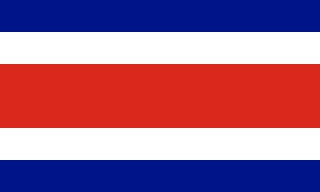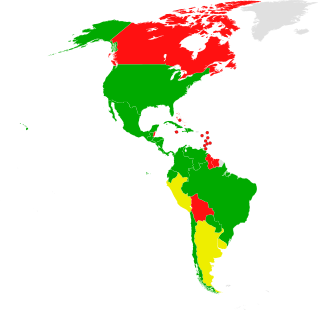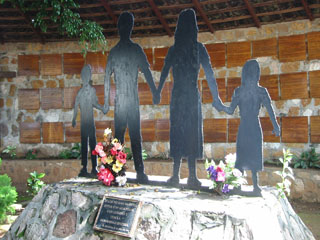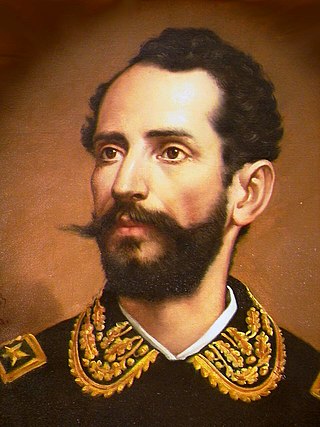Related Research Articles

Costa Rica, officially the Republic of Costa Rica, is a country in the Central American region of North America. Costa Rica is bordered by Nicaragua to the north, the Caribbean Sea to the northeast, Panama to the southeast, and the Pacific Ocean to the southwest, as well as maritime border with Ecuador to the south of Cocos Island. It has a population of around five million in a land area of 51,060 km2 (19,710 sq mi). An estimated 333,980 people live in the capital and largest city, San José, with around two million people in the surrounding metropolitan area.

The Montevideo Convention on the Rights and Duties of States is a treaty signed at Montevideo, Uruguay, on December 26, 1933, during the Seventh International Conference of American States. The Convention codifies the declarative theory of statehood as accepted as part of customary international law. At the conference, United States President Franklin D. Roosevelt and Secretary of State Cordell Hull declared the Good Neighbor Policy, which opposed U.S. armed intervention in inter-American affairs. The convention was signed by 19 states. The acceptance of three of the signatories was subject to minor reservations. Those states were Brazil, Peru and the United States.

In an extradition, one jurisdiction delivers a person accused or convicted of committing a crime in another jurisdiction, over to the other's law enforcement. It is a cooperative law enforcement procedure between the two jurisdictions and depends on the arrangements made between them. In addition to legal aspects of the process, extradition also involves the physical transfer of custody of the person being extradited to the legal authority of the requesting jurisdiction.

The American Convention on Human Rights, also known as the Pact of San José, is an international human rights instrument. It was adopted by many countries in the Western Hemisphere in San José, Costa Rica, on 22 November 1969. It came into force after the eleventh instrument of ratification was deposited on 18 July 1978.

General Tomás Miguel Guardia Gutiérrez was President of Costa Rica on two occasions: from 1870 to 1876, and from 1877 to 1882.

The Costa Rica national football team represents Costa Rica in men's international football. The national team is administered by the Costa Rican Football Federation (FEDEFUTBOL), the governing body for football in Costa Rica. It has been a member of the Fédération Internationale de Football Association (FIFA) since 1927, the Confederation of North, Central American and Caribbean Association Football (CONCACAF) since 1961, and a member of the Central American Football Union (UNCAF) since 1990.

Kindler v Canada (Minister of Justice) was a landmark decision of the Supreme Court of Canada that held that the government policy that allowed for extradition of convicted criminals to a country in which they may face the death penalty was valid under the Canadian Charter of Rights and Freedoms. The Court repeated that finding in Reference re Ng Extradition in 1991. However, Kindler was essentially overruled in 2001 with United States v. Burns.

United States v Burns [2001] 1 S.C.R. 283, 2001 SCC 7, was a decision by the Supreme Court of Canada that found that extradition of individuals to countries in which they may face the death penalty is a breach of fundamental justice under section 7 of the Canadian Charter of Rights and Freedoms. The decision reached that conclusion by a discussion of evidence regarding the arbitrary nature of execution although the Court did not go so far as to say that execution was also unconstitutional under section 12 of the Charter, which forbids cruel and unusual punishments.

The Inter-American Convention to Prevent and Punish Torture (IACPPT) is an international human rights instrument, created in 1985 within the Western Hemisphere Organization of American States and intended to prevent torture and other similar activities.

José María Cañas Escamilla was a Salvadoran military figure. He was born in Suchitoto, El Salvador.
Soering v United Kingdom 161 Eur. Ct. H.R. (1989) is a landmark judgment of the European Court of Human Rights (ECtHR) which established that extradition of a German national to the United States to face charges of capital murder and the potential exposure of said citizen to the death row phenomenon violated Article 3 of the European Convention on Human Rights (ECHR) guaranteeing the right against inhuman and degrading treatment. In addition to the precedent established by the judgment, the judgment specifically resulted in the United States and the State of Virginia committing to not seeking the death penalty against the German national involved in the case, and he was eventually extradited to the United States.
Capital punishment is no longer applied in San Marino: the last execution was carried out in 1468 or in 1667, by hanging.
Capital punishment is abolished in Bolivarian Republic of Venezuela.

Capital punishment in Macau was formally abolished in 1976 and reiterated in the Penal Code of Macau in 1995.

The nations of Costa Rica and Mexico established diplomatic relations 1838. Both nations are members of the Association of Caribbean States, Community of Latin American and Caribbean States, Organization of American States, Organization of Ibero-American States and the United Nations.

Costa Rica–Spain relations are the diplomatic relations between Costa Rica and Spain. Both nations are members of the Association of Academies of the Spanish Language and the Organization of Ibero-American States.
Capital punishment is abolished in Argentina and is no longer a lawful punishment in the country. Argentina abolished capital punishment for ordinary crimes in 1984 and abolished it for all crimes in 2008, supported by the president at the time, Cristina Fernández de Kirchner. Argentina voted in favor of the United Nations moratorium on the death penalty eight times, in 2007, 2008, 2010, 2012, 2014, 2016, 2018, and 2020. Argentina signed the Second Optional Protocol to the International Covenant on Civil and Political Rights on 20 Dec 2006 and ratified it on 2 Sep 2008.
Capital punishment has been abolished in Bolivia and is no longer a lawful punishment in the country. It was abolished for ordinary crimes in 1997, and for all crimes in 2009. Bolivia's last execution was of Melquiades Suxo on 30 August 1973.
Capital punishment was abolished in Colombia by constitution in 1910. In prohibiting the death penalty, the Colombian Constitution of 1991 states "The right to life is inviolable. There will be no death penalty." The last person to be legally executed in Colombia was Manuel Saturio Valencia by firing squad on 5 May 1907 for arson.
Capital punishment was abolished in Guinea. The civilian death penalty was abolished in 2016. It was abolished under military law in 2017. Guinea carried out its last execution in 2001. Prior to its abolition for ordinary crimes in 2016, Guinea was classified as retentionist.
References
- ↑ "The Death Penalty Worldwide". InfoPlease. Retrieved 2019-06-19.
- ↑ Reeves, J.S. “Extradition Treaties and the Death Penalty.” American Journal of International Law 18, no. 2 (1924): 298–300. doi:10.2307/2188397.